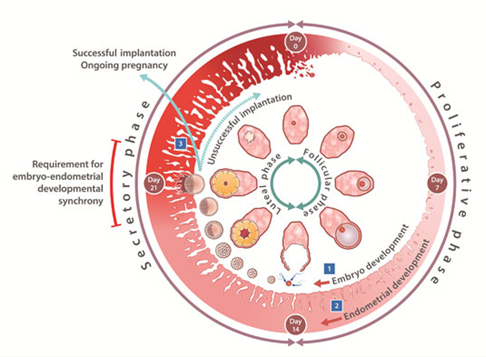Endometrial Receptivity Analysis & Timed Embryo Replacement
is one of the main causes of recurring implantation failure.
Introduction
This procedure is a personalised genetic test that involves taking a biopsy of your womb lining, (the endometrium), to see when it is most receptive for embryo implantation.
Who?
Typically, a lack of synchronisation between the embryo being transferred and your endometrial receptivity is one of the main causes of recurring implantation failure. This is why it is imperative to assess the endometrium in order to determine the optimal day for embryo transfer. In a normal reproductive cycle, a woman is most receptive to transfer during days 19-21. This is what is known as the ‘window of implantation’. If however, the woman’s cycles are irregular, we need to monitor the endometrium to assess when this optimum time is in order to prepare the embryos in our laboratory for a timed transfer.
How?
You will need to undergo a traditional cycle of IVF treatment in order that we can collect and fertilise your eggs with your partners (or donors) sperm and monitor your developing embryos in our laboratory. If we have advised that an ERA and timed replacement is necessary, we will freeze your embryos for use at the optimum time in your cycle, conducive with the ERA test results or for a subsequent treatment. The ERA test will have to be done either in a natural cycle or medicated cycle to mimic the type of cycle to be chosen for the actual frozen embryo replacement. So in the event the transfer is to be scheduled in a natural cycle, then the biopsy will be taken 6 days after confirmed ovulation by ultrasound (or 7 days post LH surge). Alternatively, if you have been advised a transfer in a medicated HRT cycle then the biopsy will be taken on the 6th day of progesterone administration.
A biopsy is quickly and easily taken by our consultant in our procedure room. The test will be able to advise whether your endometrium is receptive or non-receptive.
If receptive, this indicates that your window of implantation falls on the day of your cycle during which the biopsy was performed and that an embryo could be transferred to the uterus during this same period in a subsequent frozen embryo transfer cycle following the same regime

What happens next?
Once the embryos have been transferred into your uterus, you will be need to continue taking any drugs prescribed in your treatment and wait 16 days before taking a pregnancy test to see if your treatment has been successful. You can continue your day to day activities but we recommend you refrain from any strenuous physical exercise and rest if you feel you need to. The clinic will confirm your pregnancy with ultrasound scans and blood tests before discharging you back to your own GP for antenatal care.
What are the side-effects/risks?
Pain after this procedure is usually mild but you may experience spotting or light bleeding and your next menstrual period may be early or late. You will be given antibiotics to prevent infection. Infection usually presents as fever, pain in your abdomen or foul-smelling discharge from your vagina.If at any time you are concerned, please do contact the clinic for advice





 WhatsApp us
WhatsApp us